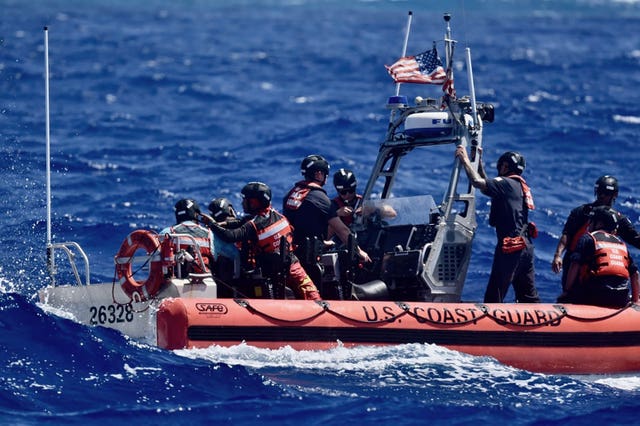Three men rescued from Pacific island after creating ‘help’ sign on beach
The men from Micronesia were fishing when they hit a coral reef, putting a hole in the boat’s bottom.

Three men stranded on an uninhabited Pacific island survived for more than a week and used palm fronds to spell out “help” on the beach – leading to a rescue by Navy and Coast Guard pilots who spotted the sign from several thousand feet in the air.
They had embarked on March 31 in a 20ft boat with an outboard motor from Pulawat Atoll, a small island with about 1,000 inhabitants in the Federated States of Micronesia about 1,800 miles east of the Philippines.
The men were fishing when they hit a coral reef, putting a hole in the boat’s bottom and causing it to take on water, Lieutenant Keith Arnold said in a Coast Guard video.
A Coast Guard ship, the Oliver Henry, picked up the men on Tuesday and took them back to the atoll, which was 100 miles away, where they had set out nine days earlier.

When their boat was damaged “they knew they weren’t going to be able to make their return home and would need to beach their vessel”, Mr Arnold said.
On April 6, a relative reported them missing to a Coast Guard facility in Guam, saying the men in their 40s had not returned from Pikelot Atoll. A search initially covering 78,000 square miles began.
The crew of a US Navy P-8 Poseidon plane from Kadena Air Force Base in Japan spotted the three on Pikelot and dropped survival packages.
The next day, a Coast Guard HC-130J Hercules plane from Air Station Barbers Point in Hawaii dropped a radio which the men used to report they were thirsty but all right, Mr Arnold said.
“The help sign was pretty visible. We could see it from a couple thousand feet in the air,” Mr Arnold said.
A similar rescue of three men from Pulawat Atoll happened on Pikelot Atoll in 2020. Those men spelled out “SOS” on the beach.
An Australian military helicopter crew landed and gave them food and water before a Micronesian patrol vessel could pick them up.





